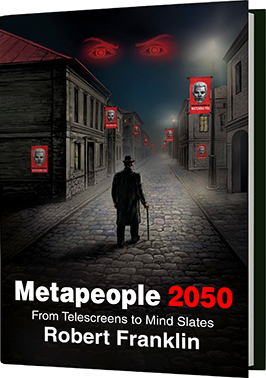|
Infinite Cold Energy (I.C.E.) is not just another physics
publication; it's a captivating journey through the frontiers of
scientific inquiry and cosmic speculation. With a blend of clarity
and depth spanning 278 pages (139 two page spreads), this book is meticulously crafted to
engage both curious laypeople and seasoned professionals alike.
From its inception in 1991, this project has evolved into a magnum
opus, leaving no stone unturned in the quest for a comprehensive Theory of Everything (ToE). Delving into the fascinating realms of
cosmology, Infinite Cold Energy sheds light on the mysteries that
precede the known epochs of cosmic evolution: the Big Bang. Robert
(Bob) Franklin's visionary framework, the Itty Bitty Teeny Weeny
Little Big Bang Theory, serves as a launching pad into a world
of profound concepts, from the enigmatic figure of
Metatron to the intricate
dynamics of supercubes and alphatrons that are incidentally
illustrated on the front cover of the book. But what sets this book
apart is its bold exploration of the intersection between science
and religion. Franklin's revelations
about the true nature of Metatrons, and the startling revelation
that the Holy Ghost and Satan themselves are
alphatrons,
challenge conventional boundaries, and invite readers to
reconsider the very fabric of reality. Moreover, Infinite Cold
Energy isn't just a theoretical treatise; it's a visual
masterpiece. Featuring over 90 meticulously crafted illustrations,
tables and charts, this book offers a feast for the eyes as well
as the mind. Each illustration, table and chart serve to elucidate complex theories, making them accessible
to all who dare to delve into their depths.
At the heart of this groundbreaking work lie Franklin's original
theories, 1D Alpha Vector Theory and
Preatomic 2D Beta Theory, which boldly
challenge the dominance of established paradigms like string
theory and
brane theory. And then there's 0D Meta Theory, a groundbreaking
concept akin to 0-brane point particles, that offer tantalizing
glimpses into the very genesis of our universe. Infinite Cold
Energy isn't just a book; it's an odyssey. It's an invitation to
embark on a voyage of discovery, where the boundaries between
science and spirituality blur, and the mysteries of existence
beckon. For anyone who has ever pondered the origins of the cosmos
or dared to dream of a unified theory that encompasses all, then this
book is essential reading. So, join us as we venture into the Infinite Cold Energy that pervades the eternal cosmos, and unlock the
secrets that lie beyond the veil of the known universe. |
|
|
|
|
| |
Book Reviews |
|
|
|
|
|
"A comprehensive collection of physics theories, including
original ideas about the
origin and functions of our universe all written with a creative
imagination.
Enjoyable characters
and innovative graphics add to this absorbing,
and dynamic
interpretation of our world." |
|
|
Shirley Egland Spalla, USC graduate,
BSc |
|
|
|
|
| |




 |
|
|
"Infinite Cold Energy is an engrossing physics
book that sets out to develop a complete
physics
Theory of Everything.
The author effectively explores the junction between
science and
religion,
attempting to explain our origins
and future in a way that
both laypeople, and specialists can
comprehend. The book covers a wide
range of themes,
including the dimensions of space, the
events preceding
the Big Bang
and futuristic concepts such as the metaverse,
quantum
teleportation, and immortality on Earth. It is written from a
distinct point
of view, challenging
established physics theories and providing readers
with a new
viewpoint about our universe." |
|
|
Kibira Wanjiku, Kenya |
|
|
|
|
| |
|
 |
|
|
About The Author |
Robert (Bob)
Franklin
is an American self-educated in theoretical
physics, a former licensed electrical contractor, a former
licensed armed alarm company owner-operator, a music recording
artist and theologian. Bob
resides in southern California.
 |
|
|
|
|
|
| |
|
|
|
|
Excerpt from Chapter 0 from the physics
book Infinite Cold Energy by Robert Franklin |
|
|
|
The word meta is derived from the Greek
language meaning after or beyond. In Latin, meta is equivalent
to the words post- or ad-. In epistemology, the word meta is
used in conjunction with another word to create a custom
category. The word meta was first used in Mycenaean Greek, the
most ancient attested form of Greek language between circa
1600 to 1100 BC. The word meta was made popular by a book
editor when he used the word metaphysics as a title for a
collection of works by the Greek philosopher and scientist
Aristotle mentioned earlier in the Introduction.
The idea for using the word meta in this book was mainly
inspired by professor Nader Engheta and his group in the
electrical engineering department at the University of
Pennsylvania, who in 2012 created the first optical circuit
dubbed a "metatronic" circuit made from a new type of manmade
material called metamaterial. Afterwards, I used the title
metatricity for several projects inspired by the metatronic
term. After that, back in 2014, I decided to start using the term meta
for the first number of the Greek numeral system instead of
the Greek word omicron which stands for the Greek letter o or
O. The symbol for zero is correctly spelled 0 and the zero
will sometimes have a forward slanting line through the middle
of the number zero, or it will have a dot in the middle. There
are a lot of people who say "O" when they should be saying
"zero," as in "0." It does make a difference, especially when
passwords are involved.
Going back in history, years ago some people feared the number
zero. Charles Seife, the author of the book Zero: The
Biography of a Dangerous Idea, mentions how the number zero
was banned by the Greeks, worshipped by the Hindus and used by
the Church to fend off heretics. Charles Seife mentions
further how the number zero is "infinity's twin," and "is both
nothing and everything," the "yin and yang." However, using
the number zero is not a substitute for the word nothing or
nothingness. The number zero is something and nothing is
nothing. Like the old saying goes: "From nothing comes
nothing." So, using the number zero for the word nothing is a
really bad idea because actually there really is no such thing
as nothing, except for the word itself. There is one exception
to there being nothing and that could be the words darkness,
and silence which is something, but at the same time is
nothing. Neither word, nor the two of them combined, are
capable of producing work in the macroscale, nor in the
sub-Planck scale.
SOMETHING versus NOTHING
Back in 1991, when I first began to work on the theory called
Infinite Cold Energy (I.C.E.) as a way to explain from where
the Big Bang originated, part of the idea was based on the
notion that everything was derived from nothing. I used the
nothingness word until some time around the mid-1990s before I
started using the word somethingness as a replacement. To this
day, I sometimes hear people say it or I will sometimes read
articles where people are still using the nothing, and
nothingness words, but the words something and somethingness
are now far more popular.
There are publications available that provide information
about the history behind the use of the word nothing. In 2001
two physics books on the subject of nothingness were
published. One book by K.C. Cole titled The Hole In The
Universe goes extensively into the subject, as well as, a book
by John D. Barrow's titled The Book of Nothing. Another word
that is sometimes used instead of the nothingness word is the
word void. Jean-Pierre Luminet, an astrophysicist who reviewed
John D. Barrow's book in 2002, stated in his review that the
Greek poet Hesiod (eighth century BC) theorized that the world
was created ex vacuo (out of the void) that existed before the
world was created, instead of ex nihilo (out of nothing). In
the review Jean-Pierre Luminet also mentioned there is a
fundamental distinction between the two words void and nothing
that for centuries has led to "commentaries and controversies
in the fields of philosophy and religion, as well as, in
science." Jean-Pierre Luminet continued on by mentioning that
another book with almost the exact same title called Book of
Nothing was published in 1510 by the illuminist philosopher
Charles de Bouelles, in Amiens, France, under the Latin title
Liber de Nichilo. Jean-Pierre Luminet finalized his statement
by saying Charles de Bouelles "invoked the metaphysical and
mystical doctrines of Nicholas of Cusa (a German philosopher)
and the Neoplatonists to show God in the act of creating a
finite and temporal universe out of the void."
|
|
|
|
| |
A 21st century
scientific thriller dystopian
novel
Metapeople 2050
by Robert Franklin.
A sequel to
George Orwell's novel
Nineteen Eighty-Four (1984).
 |
 |
|
|
|
|
|
|
|
|